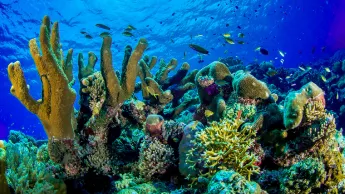Corals at risk: DAAD alumna Dr Jessica Reichert is investigating how increased temperatures, ocean acidification and microplastics are affecting tropical coral reefs. In future, she intends to dedicate her work to restoring them.
Until recently, Dr Jessica Reichert went to work in tropical conditions, even though her workplace at Justus Liebig University Giessen is thousands of kilometres away from the tropics. This was because the marine biologist was conducting her research with the help of a very unusual testing facility. The facility houses aquariums of varying sizes which together have a capacity for several thousands of litres of water, and creates the conditions found in tropical waters. Here you’ll find coral reefs, for example, along with seagrass meadows and mangroves, while artificial waves keep the water moving. Dr Reichert wants to use the Ocean2100 facility to find out more about how climate change affects coral reefs. To do this, aspects such as the temperature and acidity of the water in the tanks are slowly being adjusted to their expected 2100 levels.
No respite for coral reefs
In recent years climate change has already had a huge impact on corals. ‘Throughout earth’s history, there have always been heatwaves,’ says Jessica Reichert. Until a few years ago, corals were always able to recover from these events. Now, however, there is no respite as heatwaves are becoming more and more common. The high temperatures in 2014 and 2017 were particularly hard on coral reefs. ‘Over 70% of coral reefs around the world were harmed,’ says the 34 year old Dr Reichert.
Jessica Reichert is emphatic in her view that ‘climate change is the greatest threat to life under water. That’s why it all depends on us reducing our CO₂ emissions,’ she says. Climate change is not only causing higher temperatures. Although the effect is less pronounced, corals are also suffering from the seas becoming increasingly acidic, which interferes with how corals grow. The growing levels of microplastics in the world’s oceans are another problem. ‘It's an additional stress on the corals,’ Reichert explains.
Corals provide protection
The death of coral reefs would not only deprive humanity of a vivid natural spectacle beneath the waves. Reefs also serve as nurseries for a substantial part of all species of fish, where they can grow up, enjoying protection from predators. The loss of coral reefs would put fish stocks at risk. Reefs also help protect coastlines. ‘They slow down waves during storms, so they protect the people who live right by the sea,’ explains Dr Reichert.
Jessica started studying tropical reefs during her bachelor's and master's degrees. For her PhD, she used a 3D scanner to examine corals in order to gain a better understanding of how they grow. She also investigated how various species of corals react to microplastics. Amongst her findings were that some produce slime as a way of cleaning themselves, while others grow over the tiny plastic particles. Her later research showed how corals store plastic, unwittingly helping to reduce the amount of microplastics floating freely in the oceans.
Funding from the DAAD Centre of Excellence for Marine Research
In carrying out her research, Jessica Reichert benefited from the support of the CEMarin programme (Corporation Center of Excellence in Marine Sciences). CEMarin is the German Academic Exchange Service’s (DAAD) Centre of Excellence for marine research (see box). The programme provided the funding for the Ocean2100 facility. While working on her PhD, Reichert was awarded a scholarship which made it possible to participate in an exchange with academics and researchers from Colombia. She took part in virtual and on-site field schools and workshops in Germany and Colombia. ‘It allowed me to be part of a fascinating interdisciplinary exchange of ideas,’ says Jessica Reichert. ‘I benefit from being in the network today.’
Major contribution to protecting the oceans
CEMarin’s work in research, collaboration and networking aims to make a significant contribution to the sustainable use of marine resources, explains Michaela Klinge, who organises the programme at the DAAD. ‘Through this programme, the aim is also to share research findings with policymakers, facilitating and open dialogue between scientists, policymakers and the general public so as to help improve matters, such as the critical condition of our oceans,’ she says. Over 100 academics and researchers work together in CEMarin, and well over 50 PhD students have so far been awarded scholarships.
Jessica Reichert will continue her research as a postdoc in Hawaii. Having used her work to improve understanding of the stress factors which affect corals, she now wants to collaborate on restoring a reef. ‘What matters now is gaining a better understanding of how in future we can help corals to develop more resilient structure and thereby help them grow back.’

